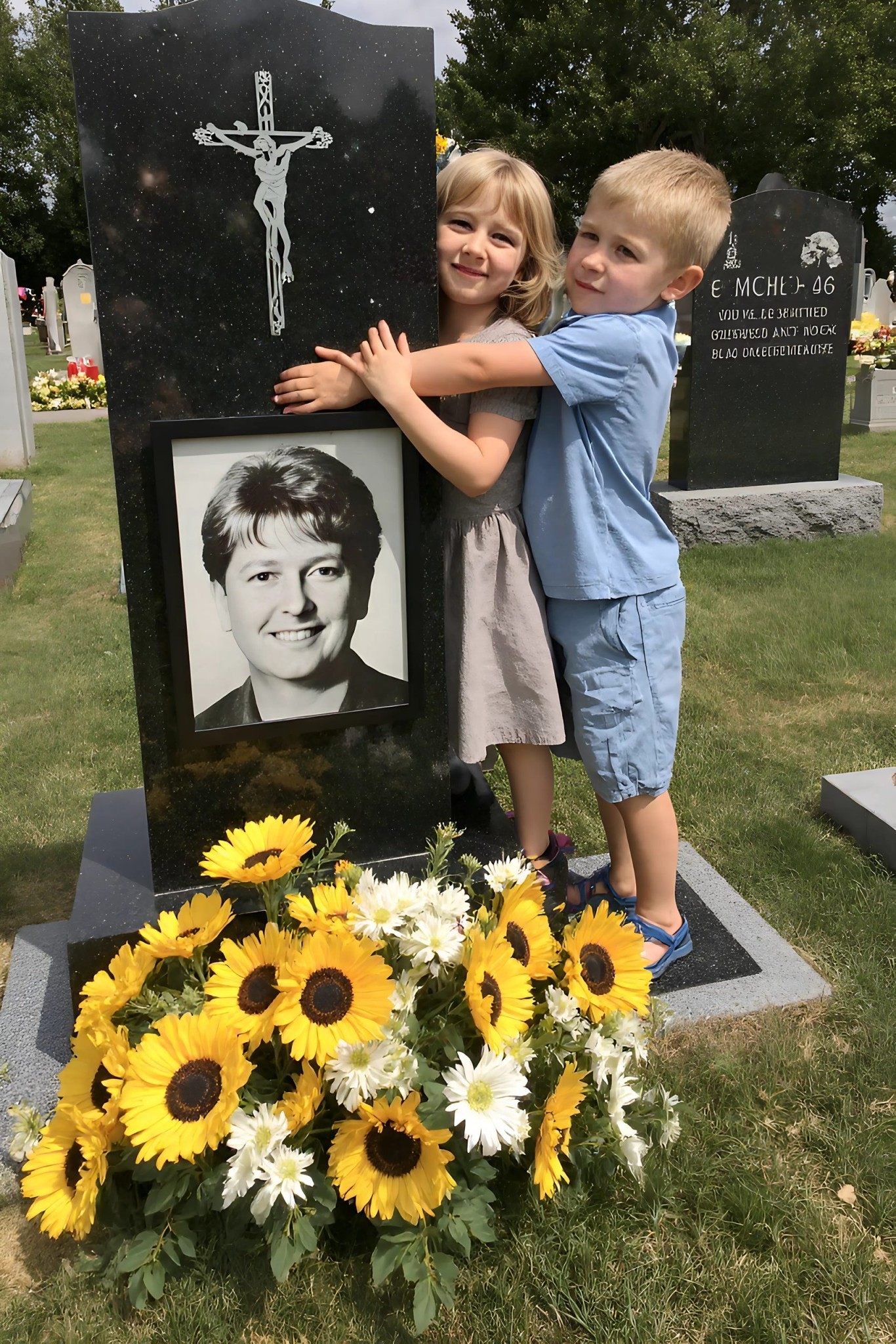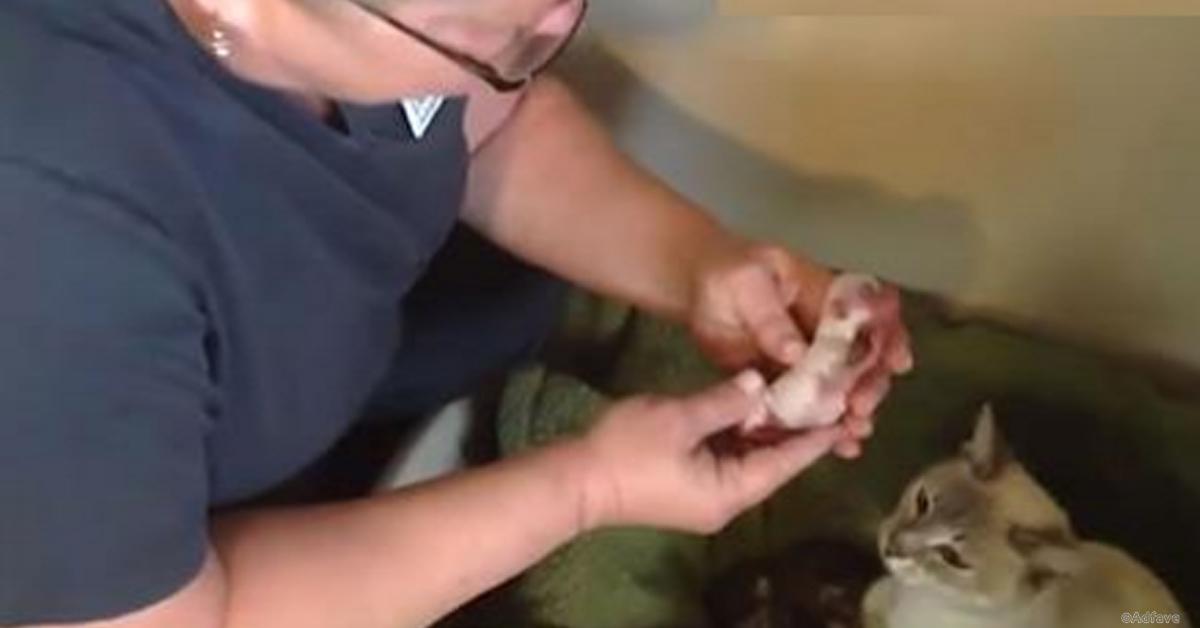WE VISITED HER GRAVE EVERY YEAR, BUT THIS TIME SOMETHING WAS DIFFERENT.
They were too young to understand when she passed away.
I still remember holding them both at the service, one on each hip, doing my best not to break down.
I told them she was in heaven, watching over us. That she loved them more than biscuits and cartoons put together.

Now they are five.
Old enough to ask questions, carry flowers, and remember more than I expected.
Every year on her birthday, we visit her grave.
We bring yellow daisies — her favourite — and take a photo to ‘show her we came,’ as I promised.
This time, we dressed up a little.
Elia insisted on wearing a grey dress because ‘Grandma liked frills.’
Andryusha wore his little button-down shirt, although half of the buttons were undone before we even reached the gate.
They hugged in front of her stone, as always.
It was supposed to be a short visit. Just flowers, a photo, and a few quiet minutes.
But then Andryusha pointed to the base of the gravestone and said,
‘That box wasn’t there last year.’

I looked down.
He was right.
Neatly hidden under the bouquet was a small wooden box.
It looked new, as if someone had just put it there.
No name. No inscription.
I opened it.
Inside was a stack of old photographs and a small, folded letter, yellowed at the edges.
Elia tugged at my sleeve. ‘Is it from Grandma?’
‘I don’t know, sweetheart,’ I said, though my heart was already pounding.
I unfolded the letter with trembling hands. It was not addressed to anyone.
A short message, written in elegant cursive handwriting.
“To the one who loved her most,
I couldn’t say it then.

But I hope this will help you understand.
— D.”
I crouched down.
My eyes darted around the cemetery, half expecting someone to be watching us from behind a tree or a neighbouring grave.
But there was no one there.
The children were too busy counting the birds in the sky to notice the change in my mood.
I leafed through the photos.
Most of them were black and white.
Some showed my mother — young, smiling, holding the hand of a man I didn’t recognise.
A tall man with broad shoulders and kind eyes.
And then I saw the one that took my breath away.
It was her. My mum. And that man.
Standing outside the old bakery on 5th Street.
She was pregnant in the photo. That was me.

I knew that bakery. It had closed down years ago, but I still remembered the smell of cinnamon rolls from my childhood.
But that man wasn’t my dad.
I mean, he definitely wasn’t my dad.
I turned the photo over. Written in pencil, barely legible, was: ‘Autumn ’91 – D & N & Baby.’
‘Who is this?’ Elia asked, pointing to the man.
‘I… don’t know,’ I said. But I had a feeling I was lying.
That night, after the children had gone to bed, I sat down at the kitchen table and laid everything out.
I called Aunt Sophie, my mother’s older sister.
She was the one who always knew all the family gossip, but never told you anything unless you asked the right questions.
‘Do you remember anyone named “D”? Someone who was close to Mum?’
There was a long silence on the other end of the line.
Then a sigh.
‘I kept wondering when you would find that box.’
My chest tightened. ‘You knew about it?’

‘She made me promise. She said if she was gone for more than five years and you still came, I could leave it.’
I leaned forward. ‘Who is the man in the photos?’
Sofia fell silent again, then said quietly, ‘His name was Denis. Your mum’s first love. Before your dad.’
‘But I thought…’
‘She loved your dad too. In her own way. But Denis… he was different.’
‘Why didn’t she end up staying with him?’
‘She wanted to. But he left. Without saying goodbye. He disappeared one day.’
I frowned. ‘And then what?’
‘Two years later, he wrote her this letter and sent her some photos. He said he never stopped loving her, but he was sick. He didn’t want her to see him fade away. He asked her not to look for him.’
My hands trembled.
‘She kept it all these years?’ I asked.
‘She read the letter once a year on her birthday,’ said Sophia. ‘Then she put it back in the box and hid it.’
I stared at the letter.
All those times I thought I knew my mother.
The sacrifices, the long hours, the quiet sadness in her eyes.

Maybe I didn’t know everything.
Sacrifices, long hours, quiet sadness in her eyes.
Perhaps I didn’t know everything.
The next morning, I took the children for a walk.
We stopped near the old bakery on 5th Street, now a boarded-up laundromat.
I stood across the street and watched.
Elia tilted her head. ‘Why are we here?’
I crouched down. ‘Because your grandmother stood here once, when she was very happy.’
They both nodded, as if it made perfect sense.
That night, I couldn’t sleep.
I kept thinking about Denise.
About what it means to carry such love and never speak of it.
About my mother, living with that silence for so long.
The following week, I returned to the cemetery.
I put the photographs and the letter back in the box, but I added something else — one of our recent photographs. Me and the children. At the beach last summer.

On the back, I wrote: ‘She raised us with love. Thank you for being part of her story.’
I carefully hid it and left it there.
I didn’t expect what happened next.
Three weeks later, I received a letter. In my postbox. No return address.
Inside was a simple note:
“I am Denis’s niece. He passed away in ’95.
He left a request that if anyone ever left a photo on her grave, I should find them.
He wanted it to be with you.”
Inside was a key.
And an address in Tver.
Against my better judgement — and with my heart full of curiosity — I went.
I left the children with their father for the weekend and drove along winding roads until I reached a small white cottage by the lake.
A man my age met me at the door. His name was Grisha.
‘My uncle’s cottage,’ he said, unlocking the door. ‘He left it all to me when I turned 18. But this room,’ he said, ‘is not to be opened until someone brings a photograph from the beach.’
We went inside.
The room was small. Cosy.

But every wall was covered with photographs of my mother. Newspaper clippings. Sketches. Poems.
Even a recording — an old cassette tape labelled ‘Her Laughter.’
I stood in the middle of it all, stunned.
‘He was obsessed with her,’ Grisha said quietly. ‘But not in a creepy way. He was deeply in love.’
I picked up one of the sketches.
My mother, younger than I had ever seen her. Smiling.
‘Why did he never contact her again?’
Grisha shrugged. “He wrote letters that he never sent. I found them after he died. He said he didn’t want to ruin her new life.”
My eyes filled with tears. ‘Do you want them?’ he asked.
I nodded.
I drove home with a box of memories in the boot.
That night, I read every letter. Some made me laugh. Others broke me.
But the last one — written a few days before Denis died — said:
‘I hope that one day her daughter will find me. I hope she learns that her mother meant something to someone once in her life.’
It was humbling.

Suddenly, my own difficulties — being a single father, trying to keep everything together — seemed easier.
As if love didn’t have to be perfect to be strong.
I told the children a little about Denise.
Enough for their age.
I told them that sometimes people love each other even if they are not meant to be together.
‘Like in the movies?’ asked Andrew.
‘Exactly,’ I smiled. ‘Only this is real.’
The next time we visited Grandma, the children brought two flowers each.
‘Why two?’ I asked.
‘One for Grandma,’ said Elia. ‘And one for the man who loved her.’
It’s strange how one box can change the way you see your whole life.
It’s even stranger how love — real love — can span decades without ever losing its shape.
I hung one of Denis’s sketches on the wall of our living room.
Right above the children’s drawings.
Because sometimes the best way to honour the past is to let it stand alongside the present.
Life has a way of hiding the truth until you’re ready to accept it.

But when it comes, it doesn’t change your story — it deepens it.
And maybe that’s what true love is.
If this story touched you, share it with someone who has loved and lost, and remind them that some stories don’t end.
They echo. Like laughter in the next room.
Have you ever discovered something unexpected about someone you thought you knew completely?

